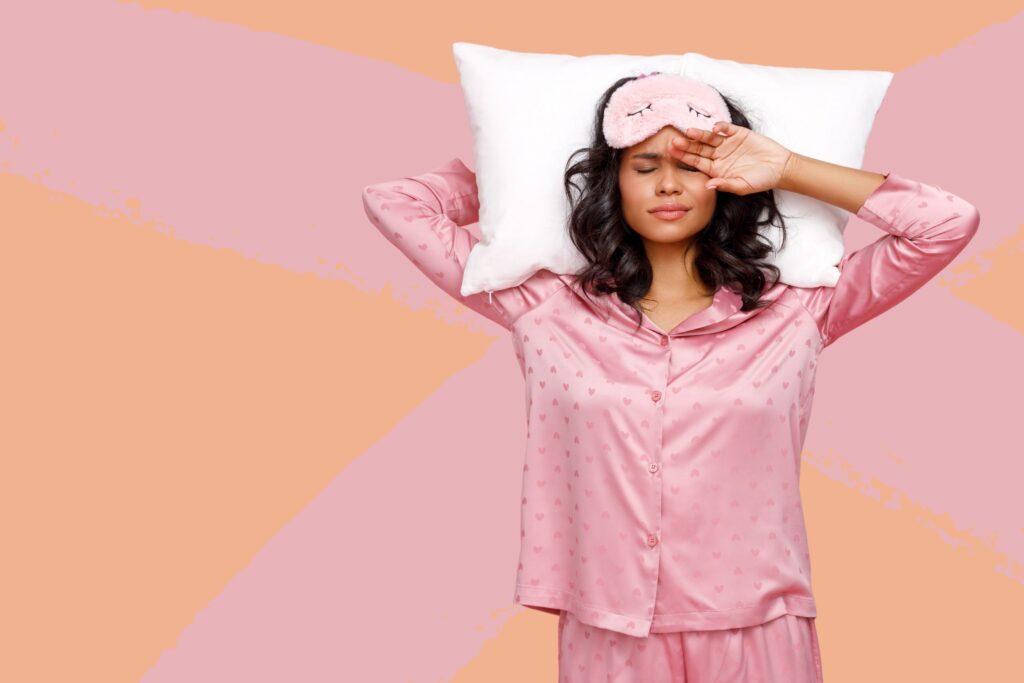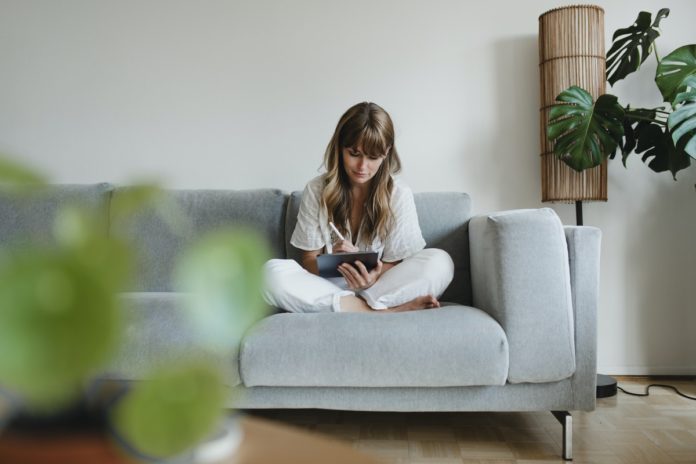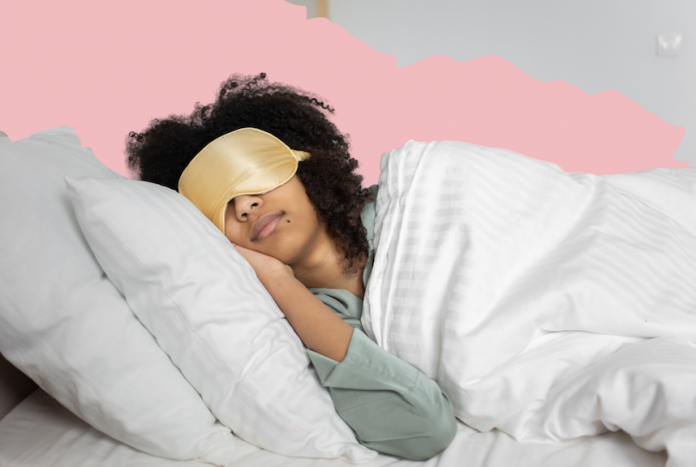Ah, the British Isles, a land known for its rich history, picturesque countryside, and, of course, sleep-deprived inhabitants…
Did you know that one in seven Brits are getting by on a measly five hours of sleep or less per night. Yes, you read that right. It seems that us Brits are struggling to catch those elusive zeds, and it’s not just because of the unpredictable weather or our rubbish government.
In the modern world, sleep has become a luxury that many of us struggle to obtain. With our busy schedules, endless to-do lists, and constant distractions, it’s no wonder we’re all walking around like caffeine-fuelled zombies. But have you ever stopped to consider how your daily habits might be sabotaging your precious slumber?
Spending Too Much Time On Our Phone
First and foremost, we must address the elephant in our hands: our beloved smartphones. These pocket-sized devices have become an extension of ourselves, and it’s no secret that we’re spending far too much time on them, on average 4 hours and 14 minutes a day, in fact.
Unfortunately, research suggests that those of us who are ‘joined at the hip’ to our smartphones and tablets are worsening the quality of their sleep. The research also stated that not only should the likes of smartphones be avoided before bed, but that too much use throughout the day can also have a negative impact on sleep.
It’s no secret that the blue light emitted from your phone screen can suppress melatonin production, making it harder to fall asleep. Indeed, it is crucial to refrain from using your smartphone, especially close to bedtime, as the blue light emitted by the device can disturb the natural production of melatonin – the hormone responsible for inducing sleep.
So, next time you find yourself scrolling through social media or binge-watching cat videos before bed, remember that you’re only making it more difficult for yourself to drift off to dreamland. Our advice? Sleep in a different room to your phone, so you won’t be tempted to pick it up.

Worrying Too Much
Us Brits are known for their stiff upper lip, but that doesn’t mean we’re immune to stress and anxiety. In fact, we reckon that our tendency to bottle up our emotions might be contributing to our sleepless nights.
Constantly fretting about work, relationships, that awkward encounter with a neighbour, or something we said to stranger last week can keep our minds racing when we should be resting.
Shona Wilkinson, nutritionist at SuperfoodUK.com, cautions that “concerns about keeping life’s spinning plates from dropping (metaphorically) can leave us feeling anxious during the day as well as into bedtime. Many will say they try to get to sleep but they are distracted by worries, which get in the way of feeling relaxed and naturally falling asleep”.
So what’s a sleep deprived Brit to do? Shona recommends using vitamin B5 in the day time to support the nervous system. “I’d also recommend using the traditional herbal medicine – passionflower” she adds. Passionflower is sometimes used for feelings of mild anxiety (so can be used in the daytime) as well as a sleep aid for night time.
Also consider taking up meditation or mindfulness practices to help calm your mind before bedtime.

Hitting Snooze
“Hitting snooze on your alarm, prolonging waking yourself up, can disrupt your morning, as you are starting a new sleep cycle, which you won’t be able to finish before your alarm goes off again. This sleeping habit can make you feel groggier in the day, and can even disrupt sleep the next night too”, explains nutritionist Cassandra Barns.
Yep, while it may seem like a harmless way to snag a few extra minutes of shut-eye, hitting snooze can actually wreak havoc on your sleep cycle. You see, when you drift back to sleep after hitting snooze, your body starts a new sleep cycle that it won’t have time to complete. This leaves you feeling groggy and disoriented, making it even harder to drag yourself out of bed. So, next time your alarm goes off, resist the siren call of the snooze button and face the day head-on (or, you know, face-first into your pillow).
Indulging in Heavy Foods
We all love a good feed from time to time, but indulging in heavy foods, especially close to bedtime, can make it harder for our bodies to wind down. Foods high in water content, hidden caffeine, and super sugary treats are also best avoided before hitting the hay.
And let’s not forget about spicy and acidic foods, which can cause heartburn and indigestion, making it even more challenging to get a good night’s sleep. So, next time you’re tempted to have that late-night curry or chocolate binge, think twice about the potential consequences for your slumber.
Dr. Marilyn Glenville, author of Natural Alternatives To Sugar, adds; “ensure you are eating little and often during the day to keep your blood sugar steady. This will ensure that the hormone cortisol will start to wind down when you go to bed, as it is supposed to do”.
She also suggests adding more magnesium to your diet, explaining that “magnesium is known as ‘nature’s tranquilliser’ and has a calming relaxing effect on the body. It is particularly helpful if your sleep is being disturbed by cramps, as it is a muscle relaxant. Try to include magnesium rich foods into your diet, such as leafy greens”.

Being Sedentary & Moving Too Little
It’s no secret that sitting all day isn’t great for your health, but did you know it can also affect your sleep? Yep, staying active during the day can help tire you out and make it easier to fall asleep at night.
Research suggests that those who exercise tend to sleep better than those who classify themselves as ‘non-exercisers’. However, the study found that even just by sitting down less a day could help improve the quality of sleep, so you don’t even have to be a ‘gym bunny’ to feel the benefits of exercise. Working out can also be a great stress reliever, helping your to feel more relaxed and ready for a good snooze by the evening.
Working out can play a major role in managing stress levels. There are two main factors affecting this, firstly, any physical activity boosts the production of the ‘happy hormone’ endorphin, also commonly known as the ‘runner’s high’. Endorphins trigger a positive feeling in the body, which reduces the feeling of pain and helps you to relax.
Too Much Caffeine
Caffeine..that magical elixir that keeps us functioning despite our chronic sleep deprivation. While a cup or two of coffee in the morning can help jumpstart your morning, consuming too much caffeine throughout the day can lead to a vicious cycle of sleeplessness. Indeed, caffeine can make it difficult to fall asleep, reduce the amount of deep sleep you get, and even delay your body clock.
“Stimulants such as tea and coffee should be avoided. Caffeine can stay in the body for up to 12 hours; so if you do have sleep problems, avoid tea or coffee from about 12 noon onwards. Also, strong dark chocolate may be better for us than milk chocolate but also contains other stimulants similar to caffeine so is best avoided before bed”, says Shona Wilkinson.
So, before you reach for that fifth cup of coffee, consider switching to a less stimulating beverage, like herbal tea or good old-fashioned water.

Having An Irregular Bedtime & Waking Routine
Oh, the joys of being a night owl! Who needs a regular bedtime routine when you can binge-watch your favourite shows, scroll through social media, or have late-night chats with friends? But beware; irregular bedtime habits may be wreaking havoc on our sleep and overall health.
Recent studies have shown that not sticking to a consistent wake-up and bedtime schedule can lead to a plethora of issues, including obesity, high cholesterol, hypertension, and even an increased risk of heart attack. Yikes! Moreover, irregular sleep schedules can also contribute to depression insomnia (of course) and other health issues.
That said, it’s not just night owls who are wreaking havoc on their sleep health. Dr. Marilyn Glenville says that “many women I see are actually falling asleep around 9pm and then find they are waking too early in the morning”.
Indeed, if you wake up too early you may end up depriving yourself consistently of much-needed sleep, which has a serious impact on your health. Glenville says that “you want to try to go to bed at the same time and get up at the same time every day. A cup of herbal tea, like camomile, an hour before bed can begin the routine. Getting up at the same time is most important”.
It seems that by constantly changing our sleep-wake times, we’re throwing our internal clocks into chaos.
Not Making Your Room A Sleep Haven
While a cluttered room might not seem like a big deal, it can actually have a significant impact on your sleep. A disorganised space can be a source of stress and make it difficult to relax and fall asleep. Plus, who wants to drift off surrounded by piles of laundry and mugs of half drunken tea.
Moreover, “it’s important to keep work out of the bedroom, so move studying and getting through your emails to another room”, says nutritionist Shona Wilkinson.
“This helps you to associate your bedroom as a place of rest. Establish the mood of the room, making it a calm and relaxing environment, this includes the colour of the walls, bed linen and décor, avoiding very bright, stimulating colours”.
So do yourself a favour and tidy up your sleeping space – your mind and body will thank you.
Drinking Too Much
Sure, a glass of wine or a cold beer might help you unwind after a long day, but drinking too much alcohol can seriously disrupt your sleep. Alcohol can cause insomnia, reduce REM sleep, and lead to frequent nighttime awakenings.
Dr. Marilyn Glenville explains; “not only does alcohol affect blood sugar levels causing adrenaline and cortisol to be released, but it also blocks the transport of tryptophan into the brain. Tryptophan is important because it is converted into serotonin, the calming and relaxing neurotransmitter”.
So, while it might be tempting to drown your sleep-deprived sorrows in a bottle of Merlot, consider cutting back on the booze if you want to catch some quality zeds.

The Bottom Line
Our daily habits can have a significant impact on our sleep – for better or worse. But improving our habits, from resisting the snooze button, cutting back on caffeine and moderating our alcohol intake, can set ourselves up for a better night’s rest.
After all, there’s nothing quite like waking up feeling refreshed and ready to tackle the day – or at least that’s what we’ve heard…





